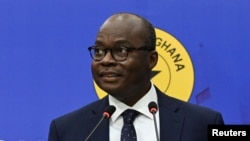The crowd marched to the central bank's head office under the watch of riot police, blaring reggae from speakers and calling for Ernest Addison, the bank's governor and his two deputies to resign.
"We want Addison out because he has shown us that he is not able to manage the Bank of Ghana," said Emmanuel Quarcoo, a 29-year-old unemployed Ghanaian.
"How can a whole Bank of Ghana go into loss. What are they selling?" Quarcoo asked.
Happy Agbezudor, a 45-year-old trader that was part of the protest said he joined the march "because the cost of living is high."
"No one is buying our wares and our children are suffering because we have no money to feed them," Agbezudor said.
Tuesday's protests were the latest show of frustration by Ghanaians who are experiencing rising living costs, joblessness and hardship. Similar multi-day protests gripped the capital last month.
Ghana's central bank in July posted a record loss of 60.8 billion cedi ($5.3 billion) for 2022, mostly due to debt restructuring.
The West African nation — a producer of gold, oil and cocoa — sealed a deal with the International Monetary Fund, IMF, for a $3 billion load program to run over three years with the mandate of helping redress the situation.
Debt restructuring is one of the conditions to obtain IMF funds.
Addison has been central bank governor since 2017 and is scheduled to hold office for another two years.
Last month he said improved economic indicators would soon lead to higher incomes and purchasing power in Ghana.
Despite the sentiments passed by the central bank governor, a stabler exchange rate, lower inflation and more robust growth are yet to help those struggling to make ends meet.

Forum